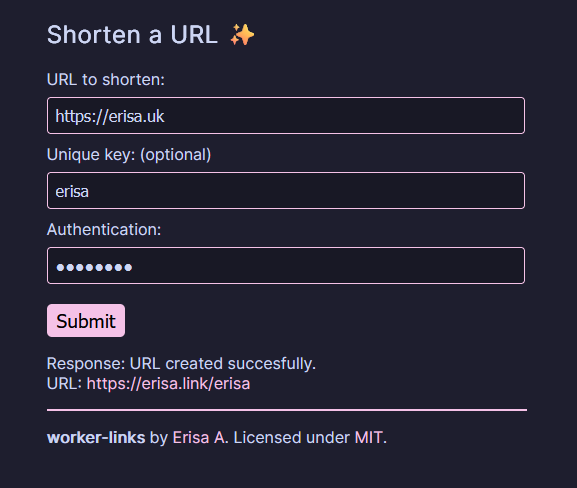A simple URL Shortener for Cloudflare Workers, using Workers KV. Redirect short URLs at the edge of the Cloudflare network to keep latency down and access fast!
I run this code in production on erisa.link, though the root name redirects and without the secret it doesn't make a very good demo.
It was made for my personal use but is available publicly in the hopes that it may be useful to someone somewhere.
Wrangler 2 is required now, but should be handled automatically for npm run commands.
To run manual wrangler commands, try npx wrangler.
Simple steps:
npm installnpm run addsecretnpm run createkv(followwrangler.tomlinstructions)npm run deploy
To deploy to your Cloudflare Workers account, edit the relevant entries in wrangler.toml, add a secret with wrangler secret put WORKERLINKS_SECRET and use wrangler publish.
For debuggging, you can use npm run dev (Which runs wrangler dev --local). To change the secret used in this mode, edit the .dev.vars file.
You can also debug on the edge with wrangler dev, though you will need to first configure a prepview namespace in wrangler.toml and add the WORKERLINKS_SECRET secret to the Worker.
If ENABLE_INDEX_FORM is enabled in wrangler.toml, an optional UI form is available when visiting the Worker in a browser, allowing easy creation of links:
Once deployed, interacting with the API should be rather simple. It's based on headers, specifically with the Authorization and URL headers.
To create a short URL with a random URL, send a POST to / with Authorization and URL headers:
erisa@Tuturu:~$ curl -X POST -H "Authorization: mysecret" -H "URL: https://erisa.uk" https://erisa.link/
{
"message": "URL created succesfully.",
"key": "q2w083eq",
"shorturl": "https://erisa.link/q2w083eq",
"longurl": "https://erisa.uk"
}And you can test it worked if you wish:
erisa@Tuturu:~$ curl https://erisa.link/q2w083eq -D-
HTTP/2 302
date: Fri, 11 Sep 2020 12:43:04 GMT
content-length: 0
location: https://erisa.uk
server: cloudflare
..other ephemeral headers..To create or update a custom short URL, send a PUT to the intended target URL:
erisa@Tuturu:~$ curl -X PUT -H "Authorization: mysecret" -H "URL: https://erisa.uk" https://erisa.link/mywebsite
{
"message": "URL created succesfully.",
"key": "mywebsite",
"shorturl": "https://erisa.link/mywebsite",
"longurl": "https://erisa.uk"
}And to delete an existing shortlink, send a DELETE to it with only the Authorization header:
erisa@Tuturu:~$ curl -X DELETE -H "Authorization: mysecret" https://erisa.link/keytodelete
{
"message": "Short URL deleted succesfully.",
"key": "keytodelete",
"shorturl": "https://erisa.link/keytodelete",
"longurl": "https://erisa.uk"
}You can also bulk create multiple shortlinks at once by sending a POST to / with no URL header and with a JSON body instead:
erisa@Tuturu:~$ curl -X POST -H "Authorization: mysecret" https://erisa.link/ \
-H 'Content-Type: application/json' \
-d '{ "/short1": "https://example.com", "/mywebsite": "https://erisa.uk" }'
{
"message": "URLs created successfully",
"entries": [
{
"key": "short1",
"shorturl": "https://erisa.link/short1",
"longurl": "https://example.com"
},
{
"key": "mywebsite",
"shorturl": "http://erisa.link/mywebsite",
"longurl": "https://erisa.uk"
}
]
}You can list all URLs by sending a GET to / (with the Authorization header set to your secret, of course).
kot@Starry:~$ curl -H "Authorization: mysecret" "https://erisa.link/?prefix=%2F&limit=1"
{
"list_complete": false,
"cursor": "AAAAAJhOXekucRAqut7Xs7Q2f09GCZyStWBfONvq6u5JP05Bg-z5FM5gf7krRaDrsvyxqfDuvFWUHIZp2n9OZ7Au92h-x68xwg8-bwerIoPd7fesG5w-ZB6f6oXopZHNXDCscmVUQ0OIaDEOx_6pruyEcCKfD3WpOstj6lO_sYJG_zQKdBgmYvLoMFQpK-cK7t8mCLWQA2t351xc9sJ08SM0JniY73t7bOdSxF3ADVTV6ihMSti0Z6svhpknfCn9VHjT",
"links": [
{
"key": "/0031qr7q7"
},
{
"key": "/00ybqita"
},
{
"key": "/02ji9wlg"
}
]
}The endpoint is paginated by default (1000/page). Just send cursor in the query string to access the next page.
You can set limit in the query string to 0 to retrieve all URLs.
You can also view URLs from your Cloudflare Dashboard:
Cloudflare Dashboard -> Workers -> KV -> View on the namespace.
To use worker-links as a URL Shortener in ShareX, create a file with a .sxcu extension (ex. worker-links.sxcu) and copy-paste the following:
{
"Version": "15.0.0",
"Name": "worker-links",
"DestinationType": "URLShortener",
"RequestMethod": "POST",
"RequestURL": "https://erisa.link",
"Headers": {
"Authorization": "mysecret",
"URL": "{input}"
},
"Body": "JSON",
"URL": "{json:shorturl}"
}Replace RequestURL with the URL of your choice and Authorization with your worker link's secret.
Now open the .sxcu file. It should make worker-links as your active custom URL Shortener.
If not, click on Destinations -> URL Shortener and choose Custom URL Shortener.
To get statistics for your short URLs with Plausible Analytics, define a PLAUSIBLE_HOST secret set to the URL of your Plausible instance. For example, https://plausible.io/.
This code is relatively simple but still, if you find any security issues that can be exploited publicly, please reach out to me via email: erisa (at) erisa.uk with any relevant details.
If you don't have access to Workers KV you're welcome to test these issues on my live erisa.link, provided you don't send excessive (constant) requests or delete/modify any keys except ones created by you or the /sample key.
If I don't respond to your email for whatever reason please feel free to publicly open an issue.
